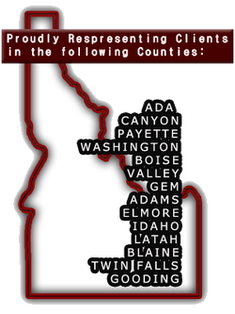|
No contact orders (“NCO”) usually arise out of cases dealing with domestic violence or where other types of violence occur against a victim. When a person violates a NCO by contacting a person protected by the order, serious legal consequences can result, including jail time, probation, community service, and fines and costs.
Idaho law gives courts the authority to issue “an order forbidding contact with another person.” Idaho Code § 18-920. A violation of a NCO occurs when a NCO has been issued and “the person charged or convicted has had contact with the stated person in violation of an order.” Idaho Code § 18-920(2). NCOs also contain language which states in relevant part: a “Defendant shall not contact (including: in person or through another person, or in writing or e-mail, or by telephone, pager, or facsimile) or attempt to contact. . .or knowingly remain within 100 feet” of the protected person. State v. Herren, 339 P.3d 1126, 1130 (2014). In a recent decision from December 9, 2014, the Idaho Supreme Court addressed whether the crime of violating a NCO is defined by Idaho Code § 18-920 or a NCO. Id. at 1128. In Herren, a NCO was issued to protect Kip McDermott from his neighbor, Nathan Herren. The court issued a NCO against Mr. Herren after he tore down a portion of Mr. McDermott’s fence and was charged and convicted of malicious injury to property. Id. Later, Mr. Herren attended a homeowners’ association meeting that Mr. McDermott was also attending and Mr. McDermott called law enforcement to report that Mr. Herren was violating his NCO. Id. The magistrate court found Mr. Herren guilty of violating the terms of the NCO because he knowingly remained within 100 feet of Mr. McDermott. Id. However, Mr. Herren appealed, and the Idaho Supreme Court eventually heard his case. The Court focused its analysis on the plain language of Idaho Code § 18-920, which specifically prohibits “contact with the stated person in violation of the order (emphasis added).” Id. at 1130. The Court then referenced the language found in the NCO which states that: a “defendant shall not contact or attempt to contact. . .or knowingly remain within 100 feet (emphasis added)” of the protected person. Id. The Court explained that the use of the word “or” to separate the term contact from knowingly remaining within 100 feet, was meant to give separate meaning to the terms (emphasis added). Id. As a result, the Court held that Mr. Herren was not guilty of violating the NCO because Idaho Code § 18-920 only prohibits contact with a protected party and Mr. Herren did not contact Mr. McDermott as that term is normally understood (emphasis added). Id. So, even though the Court noted that Mr. Herren willfully remained within 100 feet of Mr. McDermott in violation of the NCO, his conduct was not a violation of Idaho Code § 18-920. Id. The Court emphasized that if it gave authority to the language found within the NCO, it would be giving judges the power to define criminal conduct. Id. at 1131. The Court stated that it is the legislature’s job to fix this problem, not the courts. The takeaway from the Herren case is that Idaho Code § 18-920 prohibits contact with a person protected by a NCO and the word “contact” is to be given its ordinary meaning. “Contact” includes physically touching or being within a close proximity to a person, calling, emailing, facebooking, tweeting, or other contact via social media, or attempting to contact someone through another person. However, this does not mean that it is advisable for a person who has a NCO issued against them to willfully remain in close proximity to the protected person. The best course of action is to stay away from the protected person and their residence until the NCO time period lapses or the NCO is lifted.
2 Comments
Leave a Reply. |
Archives
February 2023
AuthorDevon Wilson, Marketing, PR Categories |
|
Boise Law Firm - Local Map listing
|

Jeff Nona Attorney at Law - Serving The following Counties in Idaho
Ada County Canyon County Payette County Washington County Boise County Valley County Gem County Adams County Elmore County Idaho County Latah County Blaine County Twin Falls County Gooding County |
READ ABOUT US:
legaldirectorate.com/company/jeffery-e-nona-2083311633-boise/
https://threebestrated.com/dwi-lawyers/jeffery-enona---jeff-nona-attorney-at-law-boise-city-130909058
READ ARTICLES ON OUR BLOG
legaldirectorate.com/company/jeffery-e-nona-2083311633-boise/
https://threebestrated.com/dwi-lawyers/jeffery-enona---jeff-nona-attorney-at-law-boise-city-130909058
READ ARTICLES ON OUR BLOG
If you need help, call Jeffery E. Nona, Attorney At Law today at 208-331-1633 to schedule your free initial consultation.
***The information on this website is for general information purposes only. Nothing on this site should be taken as legal advice for any is not intended to create, and receipt or viewing does not constitute, an attorney-client relationship.
Contact Us | Resources | Terms Of Use | Privacy Policy | Linking Policy | Jeff Nona Attorney at Law - All Rights Reserved
 RSS Feed
RSS Feed

